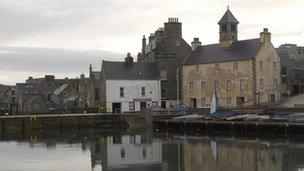Orkney, Shetland and Western Isles councils lobby for more powers
- Published

Shetland is one of the three island councils making a pitch for more control over its own affairs
Scotland's three island councils have outlined demands for greater control over their own resources.
Shetland, Orkney and Comhairle nan Eilean Siar (Western Isles) said they wanted the needs of islanders to be adequately taken into account.
The demands come ahead of electors in Scotland going to the polls on 18 September next year to vote in the independence referendum.
The Scottish government said it would engage with councils on their ideas.
In next year's independence referendum voters will be asked: "Should Scotland be an independent country?"
Angus Campbell: "It is an opportunity for the islands to put their case for why they deserve to be treated in a slightly different way."
Western Isles leader Angus Campbell said it was one of the most important times for the islands "since the inception of the island councils in 1975".
He added: "The constitutional debate offers the opportunity for the three island councils to secure increased powers for our communities to take decisions which will benefit the economies and the lives of those who live in the islands."
The local authorities want to investigate a new way forward by speaking with the Scottish and UK governments.
Some of the new powers being looked at include;
control of the sea bed around the islands, allowing revenues currently paid to the Crown Estate to be channelled locally
new grid connections to the Scottish mainland for wave, tidal and wind energy resources
new fiscal arrangements to allow the islands to benefit more directly from the harvesting of local resources, including renewable energy and fisheries
and recognition of the status of the three island groups in a new Scottish Constitutional Settlement.
Shetland MSP Tavish Scott said both the Scottish and UK governments "must react positively" to the case for more powers.
The Liberal Democrat politician added: "Government in Edinburgh or London is pretty remote from our islands.
"I am very pleased that the island councils have now produced a blueprint of what they want from their governments.
"I expect a proper, positive response from Edinburgh and London.
"Centralisation in Edinburgh has to stop and be reversed. I look forward to working with our councils on a very positive and exciting approach to delivering services for local people."
'Thriving communities'
Orkney MSP Liam McArthur said the joint statement from the three councils was a "substantive and positive contribution" to the constitutional debate.
He added: "I don't detect any real appetite in Orkney for breaking up the UK, but there is certainly a feeling that centralising decision-making in Edinburgh or London is too often failing those living and working in our islands.
"I hope that people in Orkney and the other island groups will now offer their views on the way ahead and look forward to playing my part in that process."
A Scottish government spokesman said: "We welcome this contribution to the debate on Scotland's constitutional future and look forward to engaging with the three councils on their ideas, for example when the cabinet visits Shetland at the end of July.
"The Scottish government has already made clear our intention to propose constitutional protection for the role of local authorities with independence and we remain committed to the devolution of the Crown Estate in a way that will benefit Scotland and local communities.
"Scotland's islands have enormous potential and it is in the interests of all of Scotland that we ensure our island communities are thriving communities."